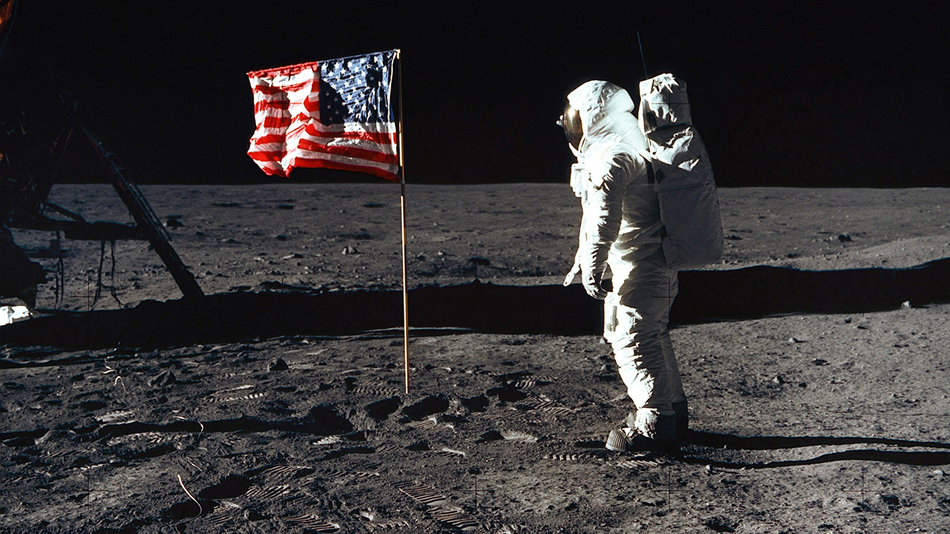In September 1962, President John F. Kennedy stood before a packed Rice University stadium and pledged to land a man on the Moon and return him safely to the Earth before the decade was out.
It appeared to most observers that Kennedy was blindly hoping for a miracle. JFK asked his nation “to do what most people thought was impossible,” as Apollo astronaut Gene Cernan recalled. Legendary NASA flight director Gene Kranz—who was played by Ed Harris in the movie Apollo 13—was also stunned by Kennedy’s bold pledge. For Kranz and his NASA colleagues “who had watched [their] rockets keel over, spin out of control, or blow up, the idea of putting a man on the Moon seemed almost too breathtakingly ambitious.”
But Kennedy was well aware of the difficulties ahead. “We choose to go to the moon in this decade and do the other things,” he said, “not because they are easy, but because they are hard.” He simply refused to let the existing reality drive his country’s future.
In 1969, less than seven years after Kennedy’s pledge, Neil Armstrong took his giant leap for mankind. A child who was 6 years old when the Wright brothers took their first powered flight—lasting all of 12 seconds and moving 120 feet—would have been 72 when flight became powerful enough to put a man on the Moon and return him safely to the Earth.
This was humanity’s first actual moonshot. But humans have been taking metaphorical moonshots long before Armstrong walked on the Moon.
Our ancestors who said “Let’s go there” took a moonshot when they blazed the first trail into the unknown. The discoverers of fire, the inventors of the wheel, the builders of the pyramids, the makers of automobiles—they were all taking moonshots. It was a moonshot for slaves to reach for freedom, for women to take the ballot, and for refugees to push toward distant shores in search of a better life.
We’re a species of moonshots—though we’ve largely forgotten it.
After the Apollo missions ended, we stopped looking up. We planted a flag and returned home, preferring to send humans into low-Earth orbit for repeated trips to the International Space Station. For many, after watching Apollo astronauts brave the roughly 239,000-mile voyage to the Moon, seeing astronauts fly 240 miles up to the Station was as thrilling as “watching Columbus sail to Ibiza.”
In our personal lives, we’ve also talked ourselves out of audacious goals. We’ve been seduced into believing that flying lower is safer than flying higher, that coasting is better than soaring, and that small dreams are wiser than moonshots.
Our expectations morph reality and become self-fulfilling prophecies.
What you strive for becomes your ceiling. Go for mediocrity, and at best, mediocrity is what you’ll get. “Not many people believe that they can move mountains,” as David Schwartz writes in The Magic of Thinking Big. “So, as a result, not many people do.”
You can’t always get what you want, as the Rolling Stones remind us. But if you course-correct in the direction of the Moon—as opposed to the ground—you’ll soar higher than you would have before. “If you set your goals ridiculously high and it’s a failure, you will fail above everyone else’s success,” says James Cameron, the filmmaker behind such blockbusters as The Terminator and Titanic.
There’s a scene at the beginning of the movie Apollo 13 when Jim Lovell, the backup commander for the Apollo 11 mission, watches with admiration as Armstrong and Aldrin take their first steps on the lunar surface. “It wasn’t a miracle,” Lovell says. “We just decided to go.”
That’s my moonshot for you: Choose to go to the Moon. Aim higher than you think is wise. Pursue an idea that others find crazy. “The day before a major breakthrough,” as Peter Diamandis says, “it is just a crazy idea.”
If we restrict ourselves to what’s seemingly possible, we’ll never reach escape velocity and create a future worth getting excited about.
Bold



